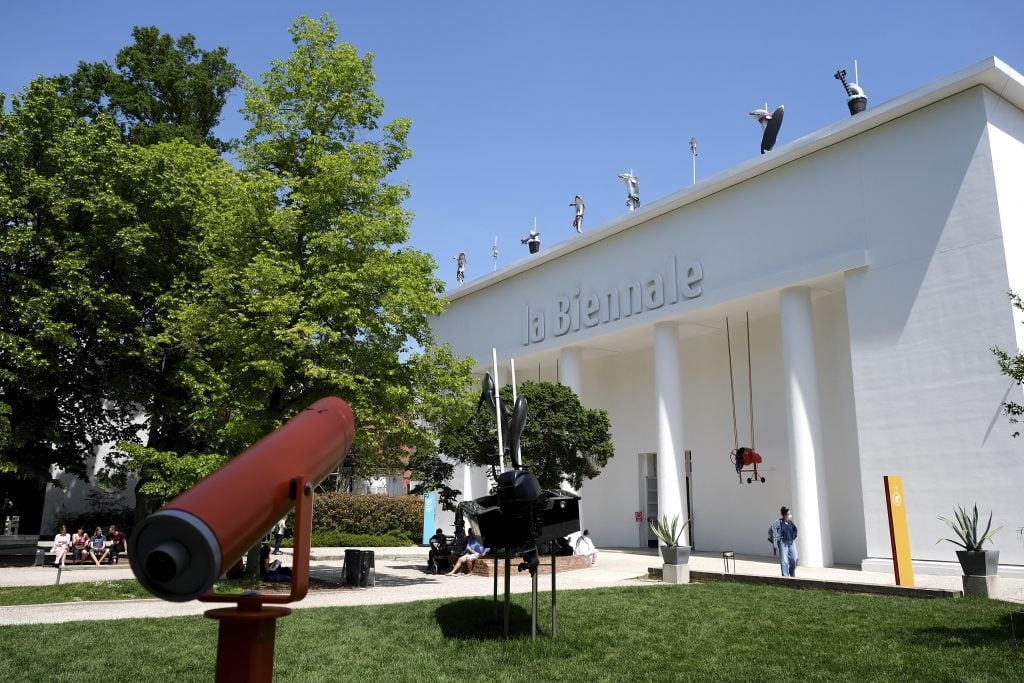Art World
Artists and Curators Call for Israel to be Excluded from the Venice Biennale
An open letter notes that apartheid South Africa was banned from participating between 1968 and 1993.

An open letter notes that apartheid South Africa was banned from participating between 1968 and 1993.

Jo Lawson-Tancred

A newly formed activist group known as the Art Not Genocide Alliance (ANGA) has published a petition calling for Israel to be excluded from participating in this year’s 60th Venice Biennale. “No Genocide Pavilion at the Venice Biennale,” the online open letter demands. So far, it has over 12,000 signatories. ANGA describes itself as an international group of artists, curators, writers, and cultural workers.
“The Biennale has been silent about Israel’s atrocities against Palestinians,” the letter states, pointing out that the Biennale and the curator of the 59th edition, Cecilia Alemani, spoke out in support of Ukraine after Russia’s invasion in February 2022. “We are appalled by this double standard.”
The letter outlines the politics surrounding the Israel-Hamas conflict as well as the huge loss of human life in Gaza, with the number of deaths recently estimated to be as high as 250 Palestinians per day. It also notes that apartheid South Africa was banned from exhibiting at the Biennale from 1968 until 1993, when apartheid rule was abolished.
“Art does not happen in a vacuum and cannot transcend reality,” the letter reads. “While Israel’s curatorial team plans their so-called ‘Fertility Pavilion’ reflecting on contemporary motherhood, Israel has murdered more than 12,000 children and destroyed access to reproductive care and medical facilities. As a result, Palestinian women have C-sections without anesthetic and give birth in the street.”
“Any work that officially represents the state of Israel is an endorsement of its genocidal policies,” the letter concludes.
Among the letter’s signatories are Adam Broomberg, a Berlin-based South African photographer who is representing the Palestinian organization Artists and Allies of Hebron in an official collateral event. Others include American artist Nan Goldin, Moroccan artist Yto Barrada, British artist and writer Hannah Black, Basel-based performance artist Sophie Jung, the Italian curatorial platform LOCALES Project, and Karachi Biennale CEO Niilofur Farrukh.
The letter has also been signed by the Palestine Museum U.S., which had its proposal for “Foreigners in their Homeland,” an exhibition showcasing work by 24 Palestinian artists, rejected by the Biennale as an official collateral event. The show will go ahead at Venice’s Palazzo Mora as an unofficial collateral event, opening on April 20.
“We think that they should allow “Foreigners in their Homeland” into the exhibit because it meets all the qualifications they were looking for,” said the museum’s director Faisal Saleh. He also noted that Palestine does not have a national pavilion because Italy does not recognize Palestine as a sovereign state.
Of Israel’s planned exhibition for the biennial, Saleh said: “This is not just an exhibition by Israeli individuals. It’s the State of Israel that’s making the exhibition. That is unacceptable when Israel is perpetrating a fully-fledged genocide against the people of Gaza.” He is also advocating for a boycott of the Biennale.
The Biennale did not immediately respond to a request for comment on ANGA’s petition.